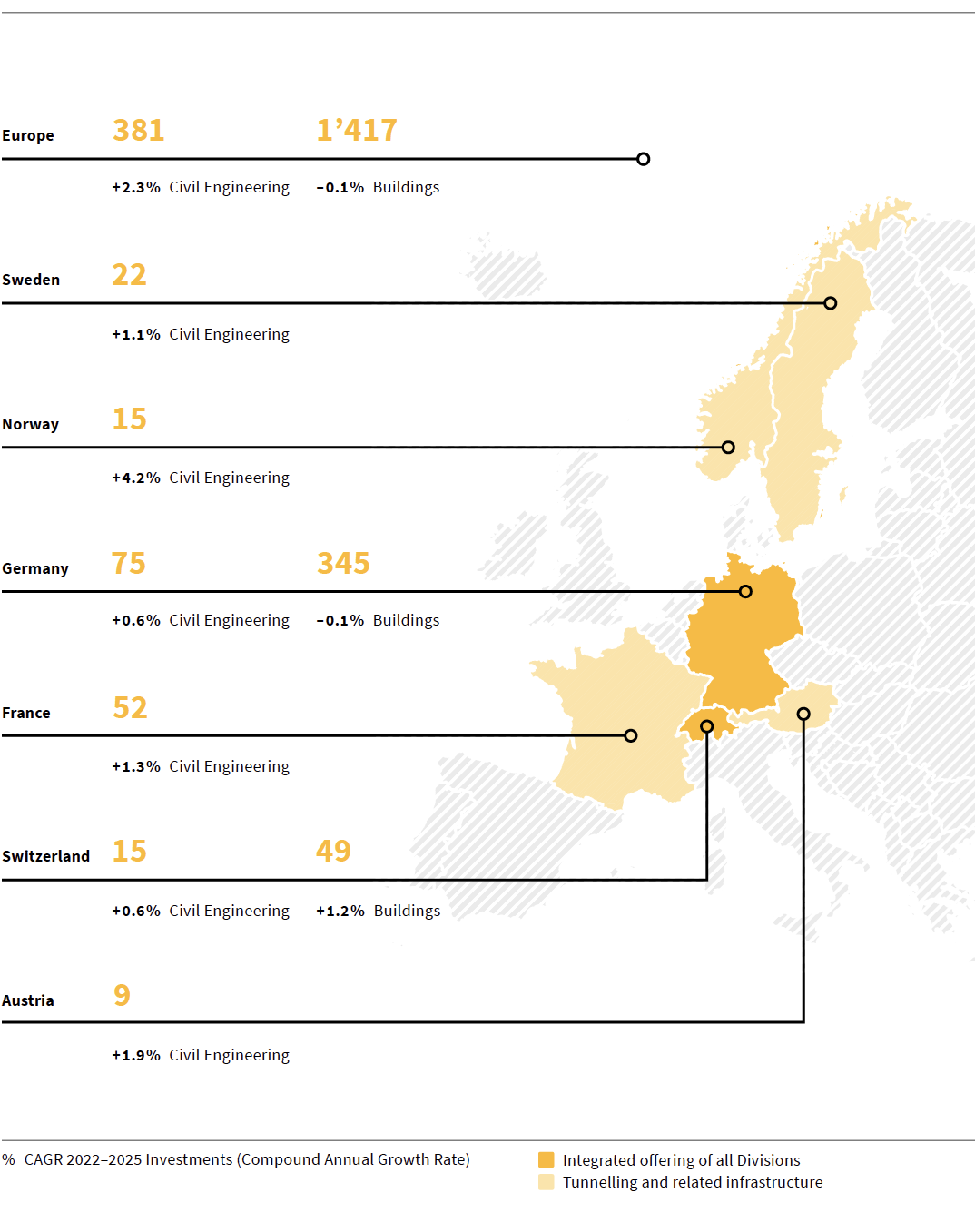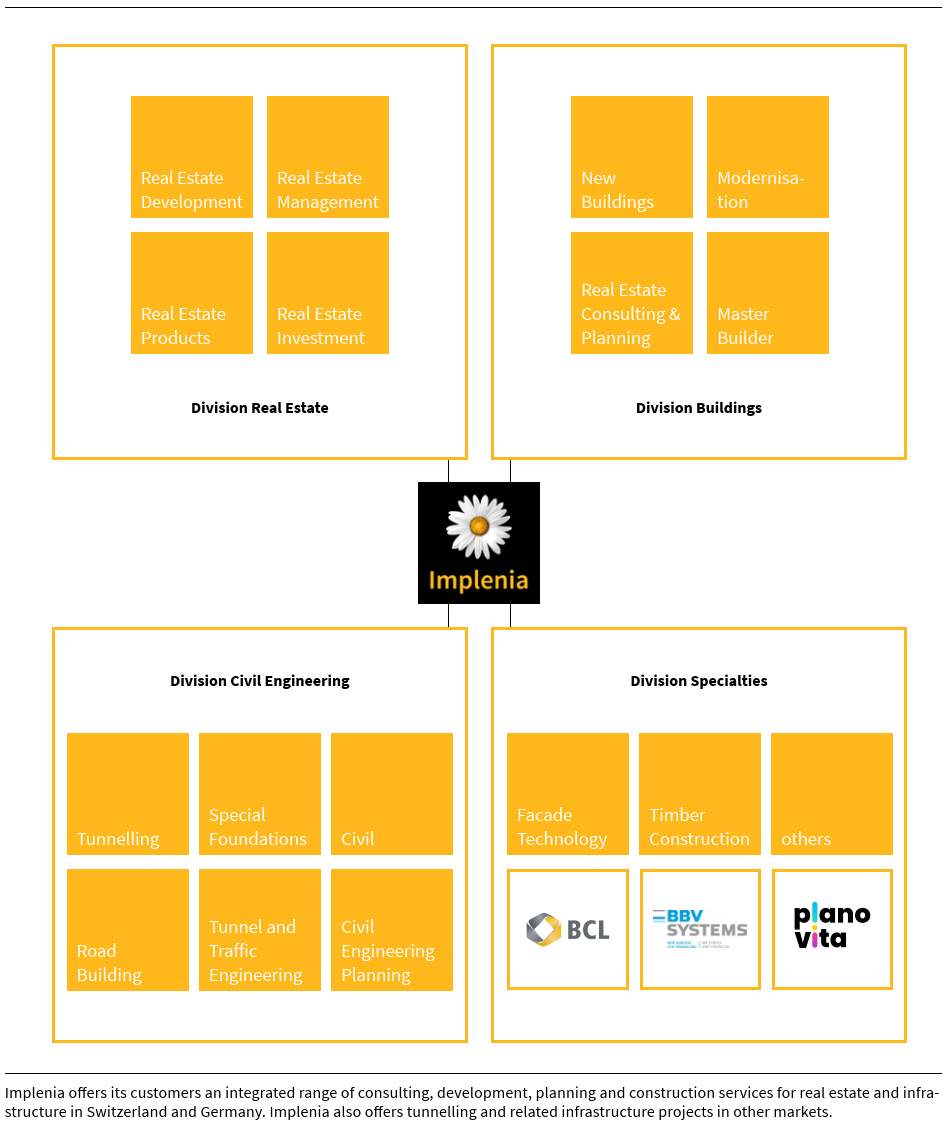Market and Customers
In brief
It is ideally positioned in a comparatively stable market environment to:
- Exploit the potential for profitable growth in its core markets Switzerland and Germany, as well as in other markets in the tunnelling sector
- Offer the services customers want in each market
- Strengthen and expand its market position
- Use its expertise and experience to meet customer needs
Construction and real estate in a European context
Investment in the real estate and infrastructure construction sectors remained positive in 2022 in the areas relevant to Implenia, as reflected in the company’s continued strong order intake. However, economic uncertainties caused by material price fluctuations, inflation and interest rate hikes have reduced the momentum.
Demand for residential properties in good, urban locations is still very high in the core markets of Switzerland and Germany. Although financing costs have increased due to higher interest rates, the incentives to renovate buildings remain in place.
Within Implenia’s infrastructure markets, there will be further investment in both new builds and in renovation and modernisation. Forecasts for the growth of construction output in Europe (EC-15 countries) have weakened: output growth in the building construction sector (CAGR 2022–2025) is forecast to be – 0.1 %, and in infrastructure construction + 2.3 %.
Market assessments and forecasts are based on data and insights from Euroconstruct.
This data is based on Euroconstruct’s segmentation of the construction sector, which is as follows:
− Residential: permanent residences and second homes owned by households
− Non-residential: all buildings that are not intended as dwellings; this includes commercial buildings offering time-limited accommodation, e.g. hotels and care homes.
– Civil engineering: transport and utility infrastructure
Prospects for core market Switzerland
Housing investment in Switzerland is forecast to rise slightly (+ 0.6 %) in 2023. In the years thereafter, growth in the residential construction sector, which is very important for Switzerland, is expected to recover to 1.3 % in 2024 and 2.9 % in 2025.
Non-residential construction is being shored up by significant investment in buildings for health, education and R&D. Growth expectations for this sector are 0.4 % for 2023, 0.6 % for 2024 and 1.2 % for 2025.
Investments in the civil engineering sector will remain stable in 2023–2025 due to major transport infrastructure projects, especially the expansion of the railway network. Civil engineering is expected to grow moderately for the next three years (2023: 0.3 %, 2024: 0.6 %, 2025: 0.7 %).
Prospects for core market Germany
Demand for residential construction will remain high in 2023 due to the current housing situation and population growth, even though real estate financing costs are increasing due to rising interest rates. In the non-residential sector, demand for new builds is weakening as the post-Covid recovery phase ends and inflation pushes up prices, particularly for construction materials and energy. Specific segments continue to show good growth. These include warehouse construction, energy upgrades and modernisation in general.
Growth of 0.6 % is expected for the building construction sector as a whole in 2023, 0.0 % in 2024 and -0.7 % in 2025. The civil engineering sector is forecast to grow by - 0.2 % in 2023 and by 1.0 % in both 2024 and 2025. Germany’s supra-regional rail network will be modernised and expanded over the next few years. According to its medium-term financial plans, the federal government will keep its investment spending on roads, railways and waterways at the current level.
Sustainable investments in markets relevant to Implenia in EUR billion

Complex infrastructure projects
In its other European markets, Implenia’s expertise in tunnel construction and related infrastructure makes it a sought-after partner for complex large-scale projects. In France, growth of 1.1 % is expected for the civil engineering sector in 2023 thanks to fiscal stimulus measures by the government and despite rises in the cost of energy and materials. Norway continues to invest in its road and rail network, which is reflected in projected growth of 6.3 % for civil engineering in 2023. Despite a continuing need for capital spending on infrastructure in Sweden, investment in infrastructure construction there will decline due to a shift in government priorities and is forecast to be -1.7 % in 2023. In Austria, investment in civil engineering will shift from transport to energy infrastructure, and in particular to the renewable energy sector. The civil engineering sector is expected to grow by 3.0 % in 2023.
Significance for Implenia
Forecast market growth for the two core markets of Switzerland and Germany has weakened due to economic uncertainty. However, there is still high demand for large-scale real estate projects in attractive urban locations and complex infrastructure projects. Macroeconomic developments are being closely monitored and measures are being taken to mitigate the associated risks.
Its continued healthy order intake shows that Implenia, with its comprehensive, integrated range of services across all four Divisions, is excellently positioned in its core markets of Switzerland and Germany. In Germany, in particular, where market share is still lower, there is considerable growth potential for Division Buildings – with its focus on large, complex projects and partnership-based contract models – and for Division Real Estate, with its Real Estate Development and Real Estate Products. Implenia will continue to expand its capabilities in the higher-margin areas of consulting, planning and engineering in Switzerland and Germany. The Group also plans to accelerate the development of high-margin business areas
through selective acquisitions.
The company will use its expertise and experience in tunnel construction and related infrastructure in other markets throughout Europe. Here, too, the focus is on large, complex projects in which the Group can best apply its specialised expertise and management skills from a single source. With its attractive service portfolio, Implenia is ready to use its strengths in all markets to meet customer requirements, gain market share and sustainably create added value.
Overview of services at Implenia’s Divisions

Customer-oriented service structure
Implenia’s customer segments are very heterogeneous: They range from large B2B customers in the public and international corporate sectors to B2C buyer groups in the market for owner-occupied apartments. Requirements are similarly varied.
Implenia’s corporate values – excellence, collaboration, agility, integrity and sustainability – guide and shape every customer relationship. For Implenia, close collaboration as partners is the ultimate goal for all customer relationships. The services provided by each Division and the way they are structured are designed to fit the requirements and opportunities of each customer segment as effectively as possible.
- Real Estate Division Real Estate develops and sells Implenia’s own real estate portfolio as well as offering all the real estate services that customers need to develop their own real estate portfolios. The Division’s services include Real Estate Development, Management, Investment and Products. At its Real Estate Products unit, the Division develops industrially manufactured, sustainable real estate products for the Green Hospitality and Best Age Living sectors. It also maintains a successful partnership with Ina Invest centred on acquisition, development and other real estate services, as well as execution. Major ongoing projects include Lokstadt in Winterthur, Green Village in Geneva, Unterfeld in Baar, Tivoli in Neuchâtel, Darmstadt and Russelsheim (both DE), as well as newly acquired sites in the Lake Geneva region and the development of the Bredella area in Pratteln together with Ina Invest.
- Buildings The customers at Division Buildings tend to be private companies, public sector institutions or other organisations with complex construction projects. These customers increasingly want an involvement in the project at an early stage based on new collaborative and contractual partnership models. These strengthen customer relationships and often lead to long-term and cross-project cooperation, such as at the Südcampus project in Bad Homburg. The Division’s customers also demand the highest standards in terms of quality, adherence to deadlines, safety and sustainability. There is attractive growth potential in properties for the healthcare sector (e.g. cantonal hospitals in Aarau and Baden) and the research and development sector (e.g. the Biomedical Department at University of Basel, Empa, Irchel Campus shared by the University of Zurich and ETH, EUREF Campus in Dusseldorf). Implenia has expanded its market presence and expertise in these areas.
- Civil Engineering Division Civil Engineering’s customers are usually public sector institutions or the companies associated with them (federal government, cantons, federal states, railway companies, etc.). Among these customers, the Division is internationally recognised and valued as a specialist for large, complex tunnelling and infrastructure projects. With the second tube of the Gotthard road tunnel, the Semmering Tunnel, the Brenner Base Tunnel and TELT (Lyon-Turin), Implenia is the only company participating in all four current Alpine transversals. At the regional level,
Implenia is also in demand for complex large-scale projects in engineering, road and rail construction, such as two major projects for the replacement of motorway bridges in Germany, and the longest railway bridge in Norway. - Specialties This Division mainly works as a service provider for third-party customers, as well as for Implenia’s other Divisions – with a focus on engineering and planning services. There is particularly strong customer demand for the services provided by BCL (construction logistics), which can make construction sites more efficient and sustainable. The Division also sees growing demand for Planovita (integrated digital building technology planning), facade technology and timber construction. BBV Systems offers its customers tailor-made tensioning solutions for various structures. Thanks to its wide variety of customer projects Implenia can evaluate ideas generated by its internal Innovation Hub at an early stage, in different phases and under real-life conditions.
Together with its customers, Implenia designs and builds the world of tomorrow. As a leading integrated, multinational construction and real estate service provider, Implenia is making a difference – to how we live, work and move in the future.
“To realise a challenging project like the EUREF Campus in Dusseldorf, where sustainability is a focus topic, you need an experienced, reliable partner like Implenia, who is willing to set high goals with you.”
Reinhard Müller
Member of the Board, EUREF AG, client of Division Buildings
Megatrends and changes in the construction and real estate industry
Longer-term megatrends shape significant changes in people’s needs.
URBANISATION By 2025, 81.2% of western Europe’s population¹ will live in urban regions (84.6% by 2040). The resulting densification requires new housing concepts that can be adapted flexibly to residents’ different lifestyles and phases of life, and which are designed to be environmentally, financially and socially sustainable.
MOBILITY AND INFRASTRUCTURE INVESTMENT By 2040, Europe will require EUR 10.7 trillion of investment in mobility and infrastructure². The way people want to move around will become increasingly individualised and complex, but this will have to go hand in hand with careful husbandry of natural resources. Mobility infrastructure has to be designed and built accordingly.
More about the future of building: focus on the future
In addition to demand-side mega-trends, the construction industry itself will also see significant changes over the next few years. Economies of scale, risk diversification and investments in innovation will gain in importance as the industry undergoes consolidation and internationalisation. Prefabrication of modules in factories is speeding up the ongoing industrialisation of the construction industry and raising productivity. Digitalisation is improving and simplifying construction planning and processes – through end-to-end use of Building Information Modeling (BIM), for example, and through the application of digital Lean Construction methods and Integrated Project Delivery (IPD). Due to increasing demand from investors and project owners, as well as through the efforts of construction companies themselves, the trend towards environmentally and socially sustainable building solutions will continue to increase.
1 United Nations World Urbanization Prospects
2 Estimate by Oxford Economics
